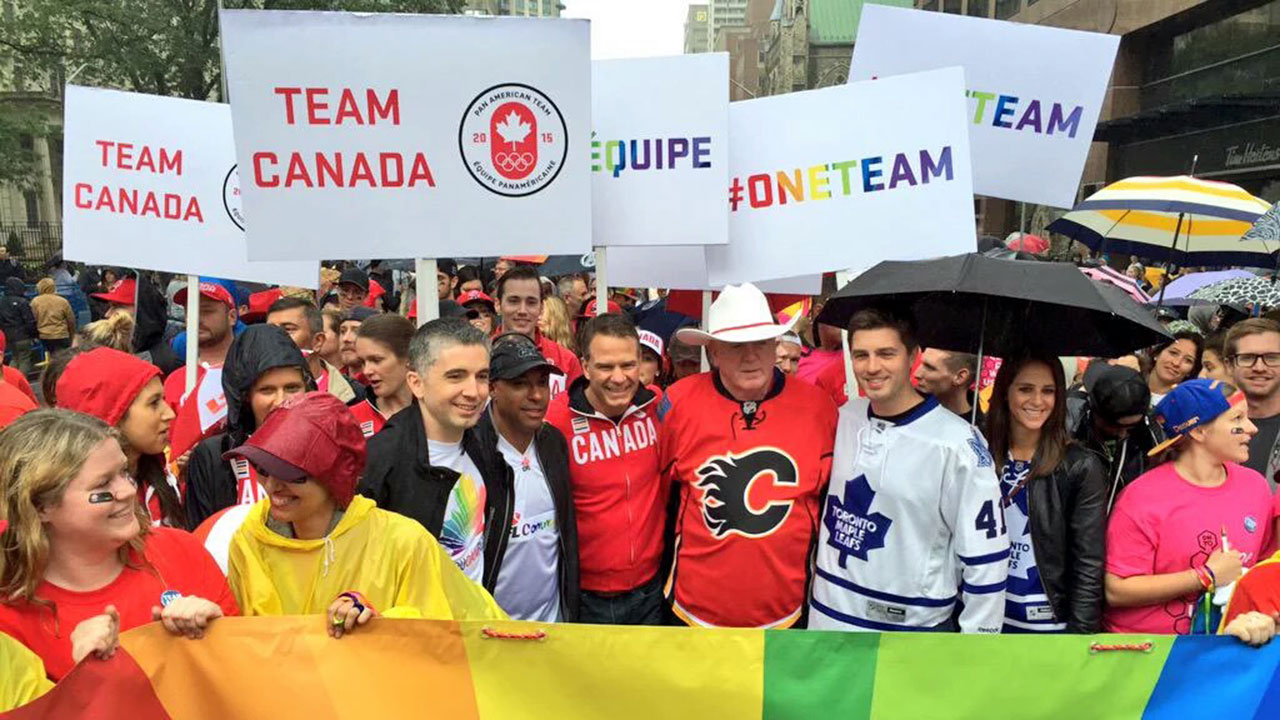It is an exciting time for the CFL. The Toronto Argonauts have new owners and a new stadium. The Saskatchewan Roughriders are heading into a new, state-of-the-art facility. The league has expanded its digital footprint and has signed a daily fantasy deal with Draft Kings.
But as league commissioner Jeffrey Orridge recites these victories off the top of his head, no other topic elicits more passion than their partnership with You Can Play, an organization that promotes the safety and inclusion for all participating in sports, including LGBTQ athletes, coaches and fans. And as much as it benefits the league’s perception externally, the real benefit for Orridge is internal. The CFLPA’s inclusion in the partnership means that players and coaches have anonymous access to counsel, tools and training on how to deal with any inclusion issues that may arise.
Orridge will forever be tied to LGBTQ rights. One of his first addresses as commissioner was a release welcoming Michael Sam to the CFL as the first out professional football player. And one of the biggest decisions he made in his first season as CFL commissioner was to walk in Toronto’s Pride Parade. It’s not something people would have necessarily expected him to do or criticized him if he didn’t do, but he did it anyway.
Last weekend Adam Silver literally followed in Orridge’s footsteps. Not only did he walk in the Pride Parade in New York City, but the NBA and WNBA had a float.
Orridge wasn’t surprised by his friend Silver’s actions.
“I think the he followed his conscience,” says Orridge. “I’ve know Adam for 25 years and he is one of he most solid people in business that I’ve ever met.”
More and more the business of sports leagues and the cultural capital involved in rights issues are rapidly becoming intertwined. Remember, we aren’t too far from May 2014, when Sam was originally drafted by the St. Louis Rams and Calgary Stampeders receiver Maurice Price was fined by the CFL for his insensitive tweets about the matter. In a short time the pendulum has swung.

In advance of this Sunday’s Toronto Pride Parade—in which Orridge will be walking for the second straight year—I spoke with the commissioner to get his perspective on LGBTQ issues in relation to the CFL.
Donnovan Bennett: What does your partnership with You Can Play entail?
Jeffrey Orridge: It’s a partnership that actually pre-dated me, technically. I believe it was June of 2014 that You Can Play and the CFL developed an official relationship. It’s consistent with the relationship the CFL has had with socially conscious and progressive initiatives that are focused on diversity and inclusion, dating back to 1951 when the CFL had the first black quarterback. The CFL [also] had the first female general manager dating back to 1989. It’s had a history of inclusion. For all the things You Can Play do—not only elevating people’s awareness and consciousness, but helping to create safe and comfortable spaces… when it comes to sports. We should all endeavor to do that because it creates a place that combines the best available talent—intellectually and athletically.
Bennett: Your tenure will forever be linked with the LGBTQ conversation. Shortly after you took over as commissioner, the Michael Sam signing with Montreal took place. What were your initial thoughts when you heard the news?
Orridge: You keep everything in perspective. It was a historic event no doubt but it wasn’t just Michael Sam coming into the league. It was a statement that no matter where you come from, no matter what your background, no matter what your sexual orientation or gender identity, this league is a league that is based on meritocracy. If they feel that you are good enough to compete you will be given a good opportunity. The fanfare was certainly there. It certainly raised the profile of the CFL. We saw we were trending in social media in places where we hadn’t previously. [The response] was relatively unprecedented for a new player coming into the league.
Bennett: The league and the Alouettes were criticized for leveraging the hype surrounding Michael Sam’s signing. Given there is a fine line between advocacy and objectivity would you have done anything differently?
Orridge: The league doesn’t drive the media. The media drives the media. The fans contribute to the media. There wasn’t any campaign that was launched by the league. So there are some things that we can’t control. We can’t control what the storyline will be at the end of the day.
Bennett: For someone who experienced the Pride Parade for the first time and is going back for more this year, what was the emotion that was evoked when you took part last year?
Orridge: I can sum it up in one word: pride. Pride literally. I was proud to be a part of the experience. I was proud to be in community with, in relation to, other people that believe that you should not be judged by labels but rather you should be judged by your content and your character. I’m a member of a historically disenfranchised group and I know what it feels like to have people marginalize you and have people make you feel less than. So I can certainly relate to the challenge and the ongoing struggle for acceptance and equality.
Bennett: Law of averages says that some of your current players are gay, but none have come out publicly. Whether or not it is a metric you are actively tracking, does that fact disappoint you?
Orridge: I think people are entitled to express themselves [how they want] and share what they want to share, so I would never pass judgment. I think that it’s a personal choice. I [just] hope that through the work we do that people feel comfortable enough, safe enough, and accepted enough that they feel they could express whatever their sexual preference or gender identity might be.


